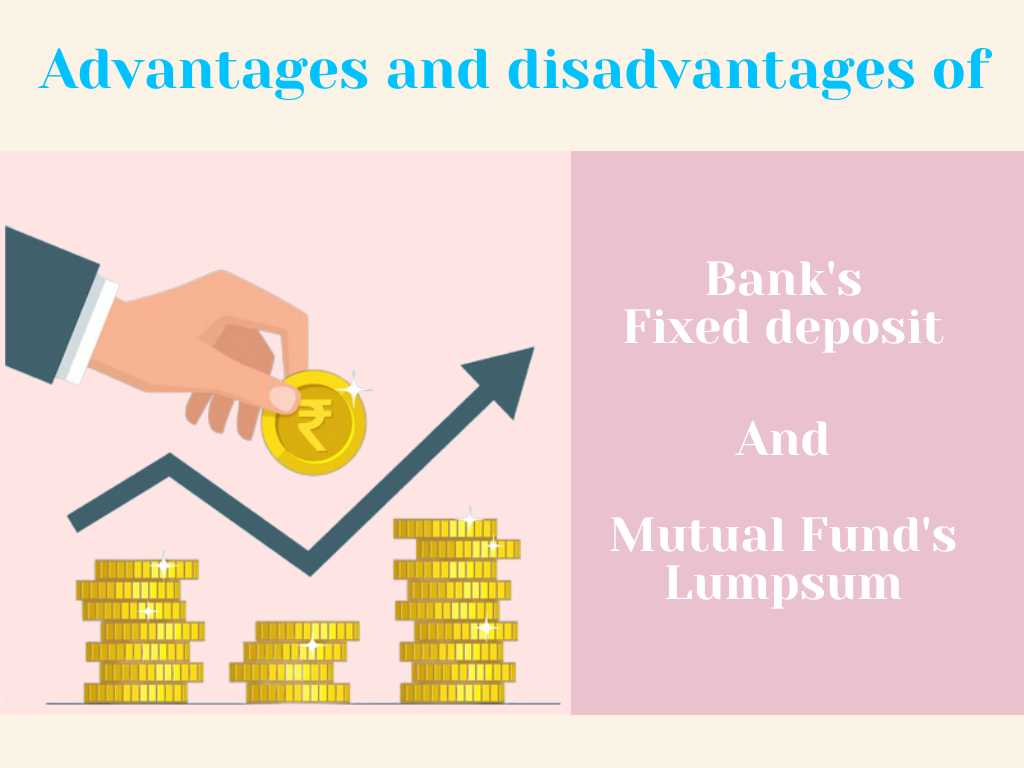What are the advantages and disadvantages of Bank s Fixed deposit and Mutual Fund s Lumpsum ?
Advantages of Bank's Fixed Deposit (FD):
Low risk: Bank FDs are considered low-risk investments as they are offered by banks and backed by the government up to a certain limit.
Guaranteed returns: Bank FDs offer guaranteed returns, and there is no risk of losing the principal amount.
Easy to understand: Bank FDs are simple to understand, and there are no complicated investment strategies to be learned.
Flexible tenure: Bank FDs offer a range of tenure options from short-term to long-term, allowing investors to choose the tenure that suits their financial goals.
Fixed interest rate: Bank FDs offer a fixed interest rate that does not change during the tenure, providing stability and predictability.
Disadvantages of Bank's Fixed Deposit (FD):
Low returns: Bank FDs generally offer lower returns compared to other investment options like mutual fund lumpsum investments.
Lack of liquidity: Bank FDs have a fixed tenure, and penalty charges may apply if you withdraw your funds before maturity.
Inflation risk: Bank FDs may not keep pace with inflation, and the returns may not be enough to meet long-term financial goals.
Advantages of Mutual Fund Lumpsum Investment:
Potential for higher returns: Mutual fund lumpsum investments offer the potential for higher returns compared to bank FDs as the returns are dependent on market performance.
Diversification: Mutual fund lumpsum investments offer diversification across different asset classes, reducing the risk of loss due to fluctuations in a single asset class.
Professional management: Mutual fund lumpsum investments are managed by professional fund managers who have the expertise and experience to make investment decisions.
Flexible investment amount: Mutual fund lumpsum investments offer flexibility in terms of investment amount.
Tax benefits: Mutual fund lumpsum investments offer the option of investing in tax-saving funds, which provide tax benefits under section 80C of the Income Tax Act, 1961.
Disadvantages of Mutual Fund Lumpsum Investment:
Risk: Mutual fund lumpsum investments carry a certain level of risk as the returns are dependent on the market performance of the underlying assets.
Complexity: Mutual fund lumpsum investments can be complex to understand, and there are various investment strategies and funds to choose from.
Lack of guaranteed returns: Mutual fund lumpsum investments do not offer guaranteed returns, and there is a risk of losing the principal amount.
Fees and charges: Mutual fund lumpsum investments may charge various fees and charges, such as management fees and exit loads, which can reduce the overall returns.
Market volatility: Mutual fund lumpsum investments are subject to market volatility, and the returns may fluctuate based on market conditions.
In summary, Bank FDs offer low-risk, low-return investments, while Mutual Fund lumpsum investments offer higher-risk, potentially higher-return investments. It is recommended to consider the features and benefits of both investment options and seek advice from a financial advisor before making a decision.


